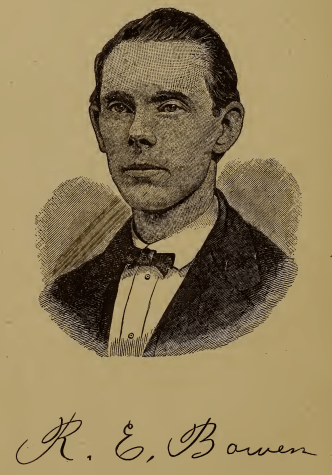Roland Edwin Bowen – Biography
Roland Edwin Bowen (1837-1883)
Born on the 5th July 1837 in Millbury Junction, Worcester County, Massachusetts, USA. He did get into the profession of being a wood-turner. In 1861 he did muster with the 15th Massachusetts Volunteer Infantry.

He was present at Ball’s Bluff, and with hundreds of others was driven over the bluffs to the river bank. He did succeed in concealing himself beneath the bank, where he remained until night, when, under cover of the darkness, he succeeded in crossing the Potomac in safety, minus most of his clothing and weapons. He was able to save his watch and has carried it ever since.
He was taken prisoner on the 2nd July 1863 at the battle of Gettysburg but did manage to escape but was recaptured and later exchanged.
”In a case of close-quarter fighting, Roland Bowen, of the 15th Massachusetts, continued to fire at the advancing Confederates of Wright’s Georgia Brigade, even though his comrades broke for the rear. Bowen resisted until it was too late to make a run for it without being shot. Flight, Bowen understood at this point, made him a legitimate target for the Confederate riflemen. So, he wrote, “I threw down my gun and held up both hands, my cap in one and begged that they might spare my life.” Wright’s men “spoke not a word to me but passed over and on.” No one from Wright’s line of battle even bothered to direct or escort Bowen to the Confederate rear. He did this on his own since this was the only direction he could travel to find safety from the bullets and shell fragments flying about. He came upon a Confederate soldier who may have been shirking, but whom Bowen found “was mighty glad to get one prisoner to go the rear himself.” (Richard Holmes, Firing Line, (London: J. Cape, 1985), 382; Gregory Coco, From Ball’s Bluff to Gettysburg and Beyond, (Gettysburg, PA: Thomas Publications, 1994), 203.)“

He was taken prisoner again on 22nd June 1864 at Petersburg, Prince George County, Virginia. After a month of imprisonment at Belle Island, he did manage to escape and entered Union lines on the 3rd August 1864. A recollection of his second escape is in detail he was included in Alvan Simonds’ recounting of the 1864 prison escape in “Fitchburg in the War of the Rebellion,” by Henry A. Willis, p. 220. He then ended military service with the 15th Massachusetts Infantry.
On 21st December 1865, now aged 28 he married Mary F. Cole, at Millbury, Massachusetts and they had 2 children.
He was appointed postmaster soon after the close of the war and has held the position without opposition a period of 16 years, during which the business of the office has constantly increased, and the requirements of the position have always been discharged with a rare degree of efficiency, which has won the cordial approval of the public and department.
About his checkered life. Bowen is very well published. He was among other things an analyst, author, mail player, problem composer. One will find his problems in a great many problem books, newspapers, or magazines. If you do open i.e. Lees’ Guide, Gould’s Problem Book, or even Ben Boland’s great works then you will find at least one of his problems.
A typical Bowen problem is late endgame playing for a positional advantage. For those who do like a good puzzle, I did cloud the move sequence if you wish to figure it out first.
He did publish opening compilations of play on the Cross (over 1000 variations), Bristol (over 2600), and Fife books (almost 600 variations). The Fife compilation did publish posthumously and later editions of his works were published by M. F. Clouser – The Checkers Editor of the New York World who did obtain Bowen’s extensive library.
In 1882 Bowen did travel to Boston to see after James “Herd Laddie” Wyllies’ interests in the match with Charles Barker. He had the following recorded match with the Herd Laddie.
R. E. Bowen passed away 1883 in Millbury aged just 45 years of tuberculosis then called consumption.
Roland E. Bowen: “Draughts, as an intellectual pastime, has no superior. It enables you to weigh yourself mentally with your fellow men; it causes the rich and the poor to intermingle in the most friendly manner; capital and labor are seen struggling across board in the most social style. Esteem and friendships spring up between devotees of the game, both far and near, and the noted players of England, Scotland, New Zealand, Australia and the Canadas are well known and admired as though they lived in our midst.”